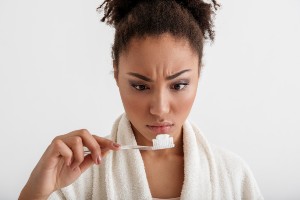What’s in Toothpaste?
 And Why Is Using It Important?
And Why Is Using It Important?
Toothpaste is the first line of defense for your teeth and overall oral health. A proper oral hygiene regimen means you should be brushing twice a day—once before bedtime and once in the morning. That’s because, during the night, saliva flow lessens and bacteria growth is at its highest, so it’s important to brush before and after this period, when your teeth are at their most vulnerable. Brushing is the best way to prevent the buildup of plaque, which can eventually lead to cavities, tooth decay, and periodontal disease.
How does toothpaste work?
The primary function of toothpaste is a mild abrasive to help remove food debris and sticky buildup from your teeth. With a gentle scrubbing action, toothpaste helps prevent the accumulation of plaque/tartar as well as remove stains. Additionally, toothpaste contains a foaming agent that helps to dislodge food debris and then carry it away from the teeth.
What are the “active” ingredients?
There are many different possible active ingredients, each with a specific purpose and function. The most common and widely known being fluoride. Fluoride promotes healthy teeth by assisting in the remineralization of enamel. Every day, our tooth enamel gets worn away due to acidity in the food we eat, as well as that produced by harmful bacteria. Fluoride, applied topically to the teeth, helps reverse this process and has been shown to reduce the occurrence of cavities.
Other typical active ingredients are those chosen for their whitening properties. These may include peroxide, or sodium triphosphate, which help to break down and dissolve stains.
Furthermore, toothpaste may have special ingredients added to combat bad breath (halitosis) as well as periodontal (gum) disease. Most commonly, these include triclosan or zinc chloride.
Which Toothpaste Should I Use?
The toothpaste that’s right for you depends on your specific needs. Call our office at 619-216-2807 to ask for a recommendation!
![]()
About Yuri Kaneda, DDS
Dr. Yuri Kaneda was born in Japan and immigrated to the US when she was 4 years old with her family. She lived in Ohio, Nebraska, and Illinois before finally settling in the San Diego area. A graduate of Bonita Vista High School, she went on to the University of California Berkeley where she obtained her Bachelors in Microbiology and Immunology. After working for 2 years in growth plate research at University of California San Diego, she went to the University of California San Francisco Dental School for her Doctor of Dental Surgery degree. Upon graduation, she returned to San Diego where she worked as an associate in the practice of Drs. Morimoto and Yaryan, her childhood dentist. She then started her own practice in 1995 and has been at her present location since 1999 which happens to be across the street from her high school!
View all posts by Yuri Kaneda, DDS →
Appointments
To schedule an appointment please email us at [email protected].

